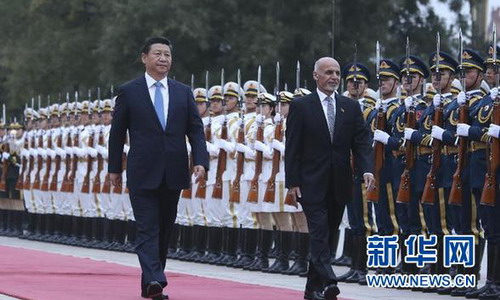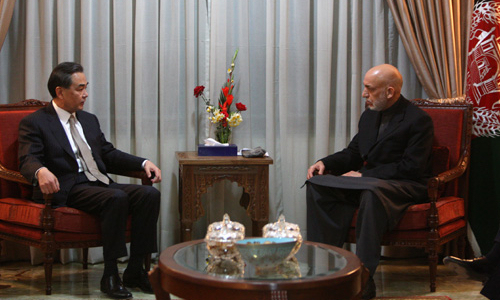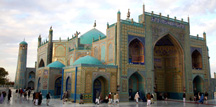The 2nd China-Afghanistan-Pakistan Foreign Ministers' Dialogue was held in Kabul on December 15th, 2018 with security, stability and development taking the center stage.
Chinese State Councilor and Foreign Minister Wang Yi said at the dialogue that the three sides have been actively implementing the consensus reached in the first trilateral foreign ministers' dialogue convened in December last year in Beijing, with progress achieved in Afghanistan's reconciliation process, continuous improvement witnessed in the relations between Afghanistan and Pakistan and the building of the China-Pakistan Economic Corridor as well as the connectivity and communication in the region further pressed forward, demonstrating the vitality and the bright future of the cooperation among the three sides.
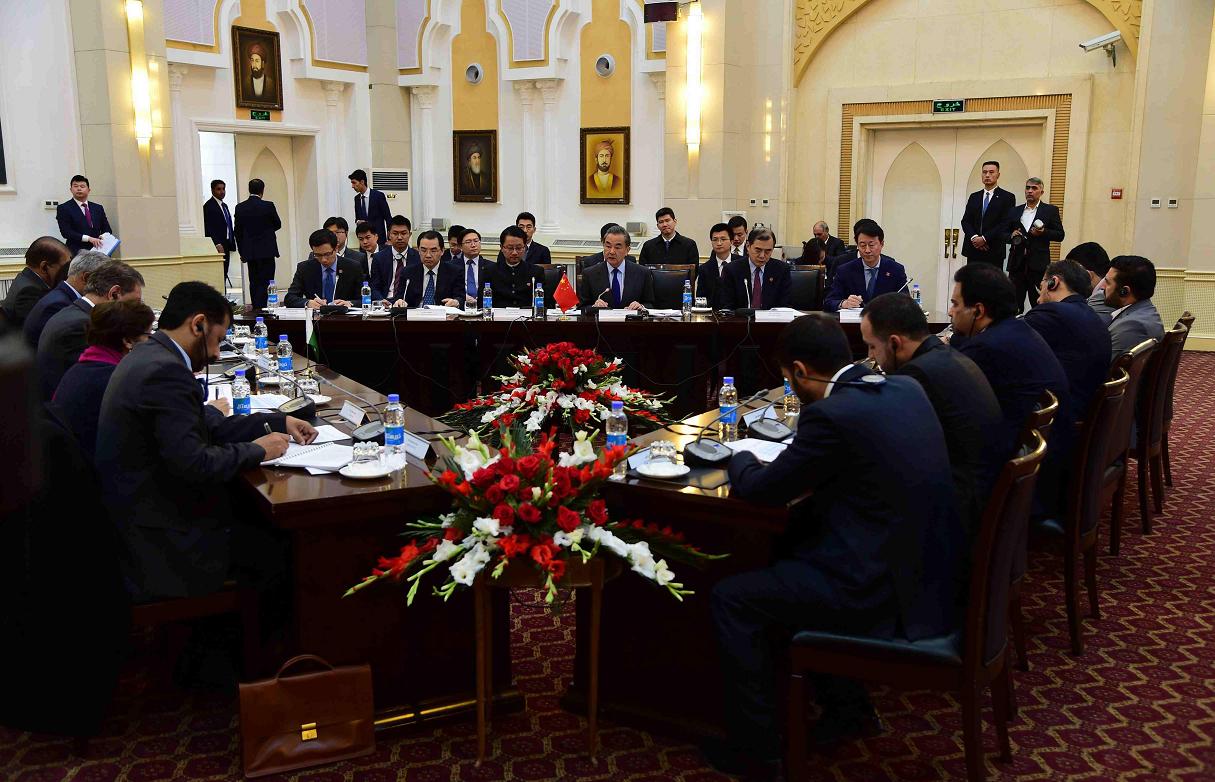
Chinese State Councilor and Foreign Minister Wang Yi attends the 2nd China-Afghanistan-Pakistan Foreign Ministers' Dialogue in Kabul, Afghanistan, on Dec. 15, 2018. The 2nd China-Afghanistan-Pakistan Foreign Ministers' Dialogue was held here on Saturday.
With the complex and changing regional and international situation, the three sides are facing new challenges and opportunities in their security and development, said Wang, hoping they will further strengthen dialogue and promote mutual trust.
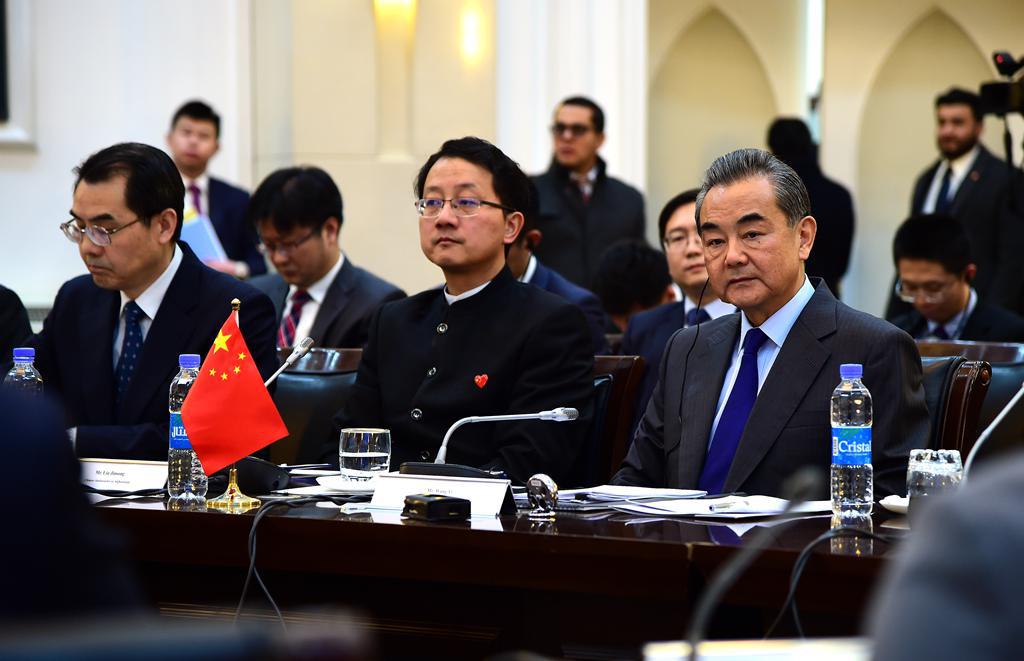
Chinese State Councilor and Foreign Minister Wang Yi attends the 2nd China-Afghanistan-Pakistan Foreign Ministers' Dialogue in Kabul, Afghanistan, on Dec. 15, 2018. The 2nd China-Afghanistan-Pakistan Foreign Ministers' Dialogue was held here on Saturday.
Wang hoped that the 2nd China-Afghanistan-Pakistan Foreign Ministers' Dialogue will reach new consensus on promoting the realization of the inclusive Afghan-led, Afghan-owned political reconciliation in the country at an early date, strengthening the momentum of the improvement of relations between Afghanistan and Pakistan, pushing forward the pragmatic cooperation and deepening cooperation in fighting terrorism so as to promote regional security, stability and development.
Afghan Foreign Minister Salahuddin Rabbani and Pakistani Foreign Minister Shah Mahmood Qureshi agreed with Wang's remarks and highly appreciated the long-term efforts China has been making in promoting the peaceful reconciliation and development in Afghanistan and in encouraging Afghanistan and Pakistan to enhance mutual understanding and improve bilateral relations.

Afghan Foreign Minister Salahuddin Rabbani attends the 2nd China-Afghanistan-Pakistan Foreign Ministers' Dialogue in Kabul, Afghanistan, on Dec. 15, 2018. The 2nd China-Afghanistan-Pakistan Foreign Ministers' Dialogue was held here on Saturday.
The foreign ministers of Afghanistan and Pakistan also fully acknowledged the positive results the three sides have achieved since the first dialogue between the three foreign ministers.
The Afghan and Pakistani sides will maintain the good momentum of improving bilateral relations and faithfully implementing the Afghanistan-Pakistan Action Plan for Peace and Solidarity, they said.
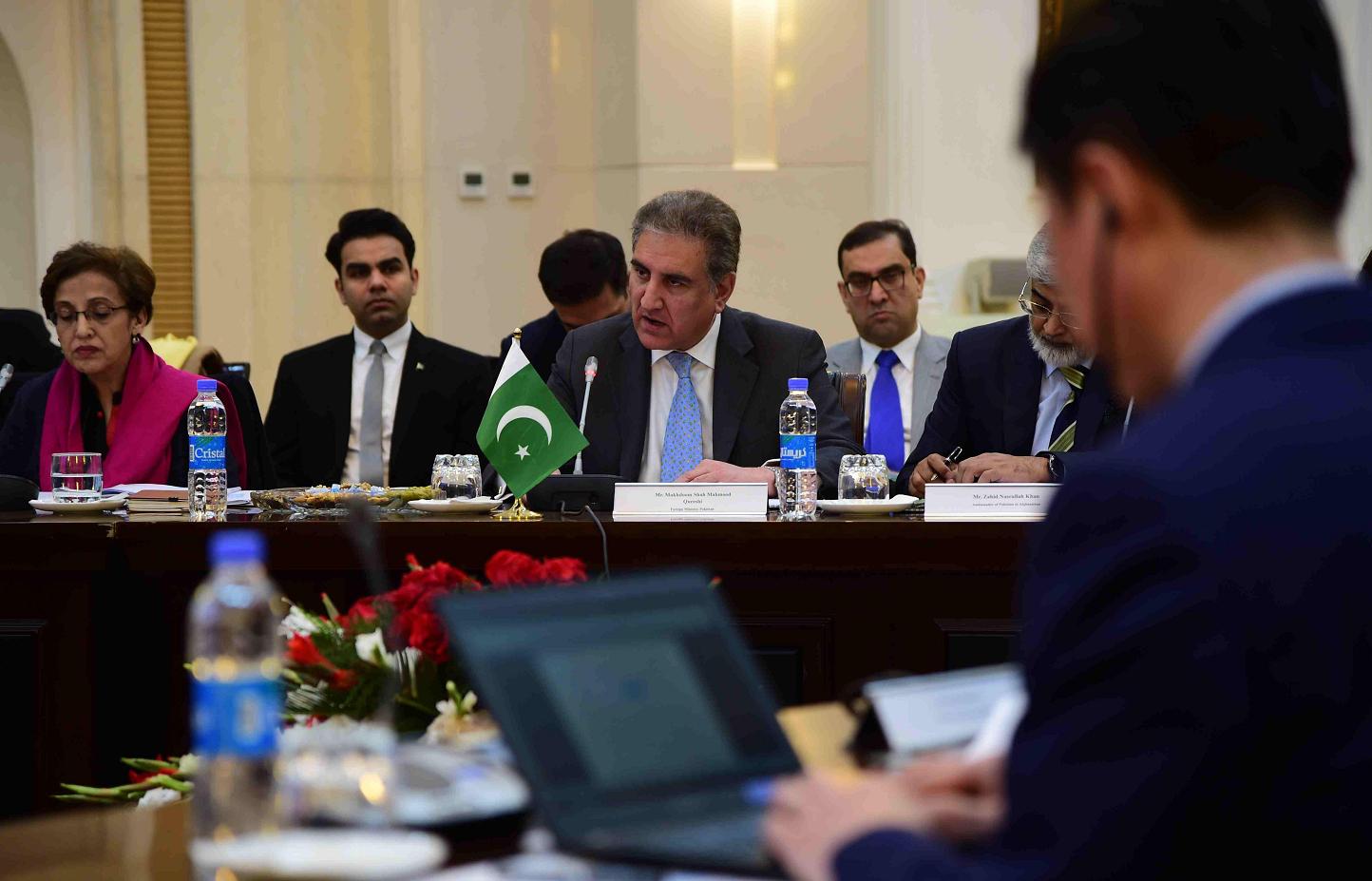
Pakistani Foreign Minister Shah Mahmood Qureshi attends the 2nd China-Afghanistan-Pakistan Foreign Ministers' Dialogue in Kabul, Afghanistan, on Dec. 15, 2018. The 2nd China-Afghanistan-Pakistan Foreign Ministers' Dialogue was held here on Saturday.
The two sides said they are willing to work with China to expand trilateral cooperation within the framework of jointly building the Belt and Road Initiative and push forward the trilateral cooperation on anti-terrorism so as to jointly safeguard the peace, stability and prosperity in the three countries and in the region.
During the dialogue, the three sides signed a Memorandum of Understanding (MoU) on jointly combating terrorism and issued a joint statement.
According to the joint statement issued, the three sides reiterated their support for the inclusive Afghan-led and Afghan-owned peace process as it is the most viable way to bring peace to Afghanistan.
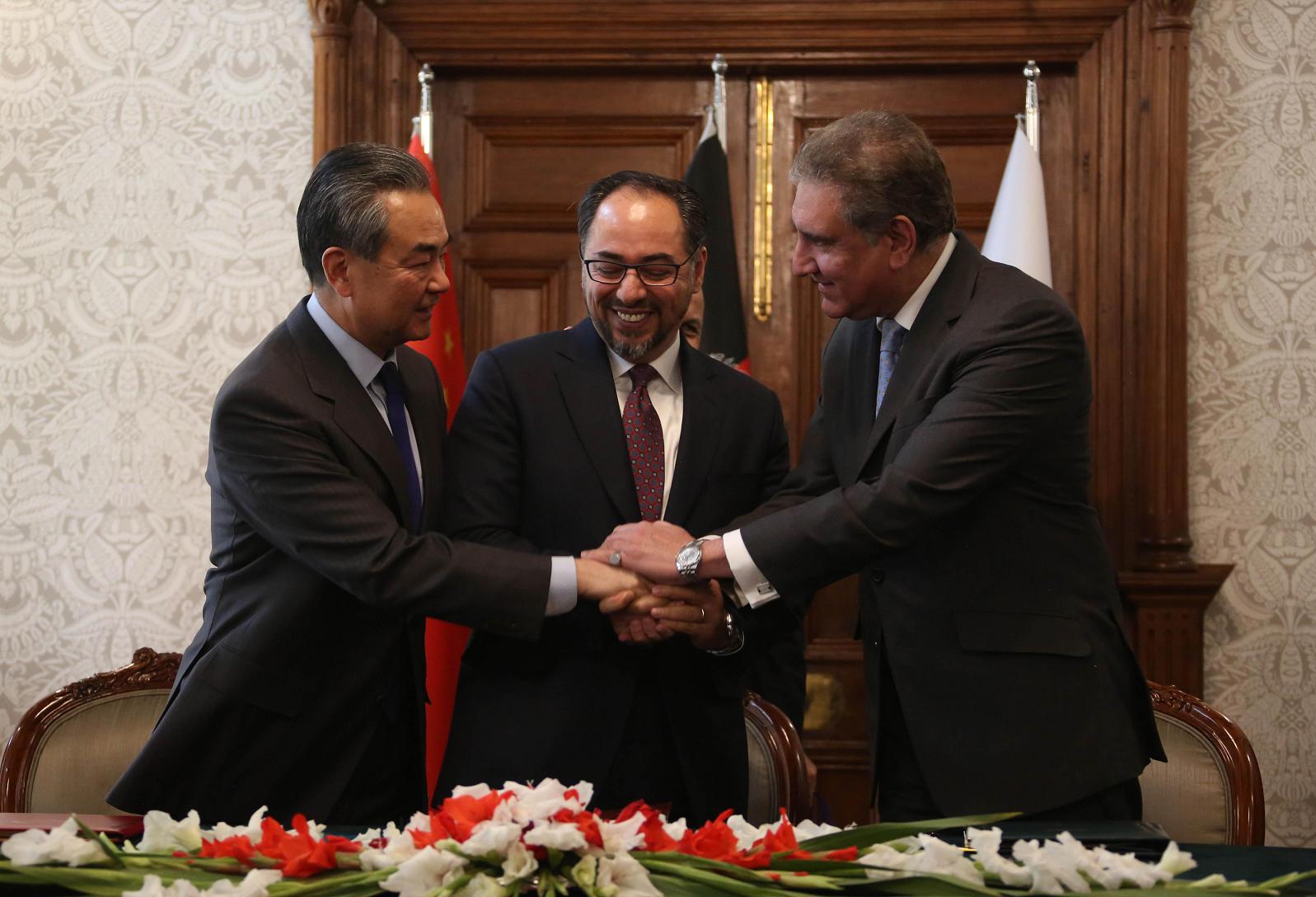
Chinese State Councilor and Foreign Minister Wang Yi, Afghan Foreign Minister Salahuddin Rabbani and Pakistani Foreign Minister Shah Mahmood Qureshi (L-R) shake hands after signing an agreement during the 2nd China-Afghanistan-Pakistan Foreign Ministers' Dialogue in Kabul, Afghanistan, on Dec. 15, 2018.
In this regard, China and Pakistan appreciated the efforts of Afghan President Mohammad Ashraf Ghani especially for the comprehensive peace plans that came out of the second meeting of Kabul Process and the Geneva Conference on Afghanistan, and therefore called on the Afghan Taliban to join the peace process at an early date, said the statement.
While efforts are underway to start the peace process, the three sides called on the parties concerned to end violence and the loss of innocent lives in Afghanistan, it said.
Regarding economic development cooperation, the three countries pledged to implement and expand the "soft" projects such as exchange and capacity building programs, and explore "hard" projects of livelihood facilities and connectivity.
China supports enhanced coordination between Afghanistan and Pakistan on major energy and connectivity projects, said the statement.
On the fight against terrorism, the three sides expressed strong determination not to allow any country, organization or individual to use their respective territories for terrorist activities against any other countries.
They also underlined the need to further strengthen counter-terrorism coordination and cooperation in an effort to combat all terrorist groups and individuals without any discrimination. To this end, the three sides signed the Memorandum of Understanding (MoU) on Counter-Terrorism.
They also agreed that the 3rd China-Afghanistan-Pakistan Foreign Ministers' Dialogue would be held in Islamabad in 2019.
Speaking to the press after attending the 2nd China-Afghanistan-Pakistan Foreign Ministers' Dialogue, China, Wang said, Afghanistan and Pakistan reached broad consensus on trilateral cooperation during the foreign ministers' dialogue between the three sides.
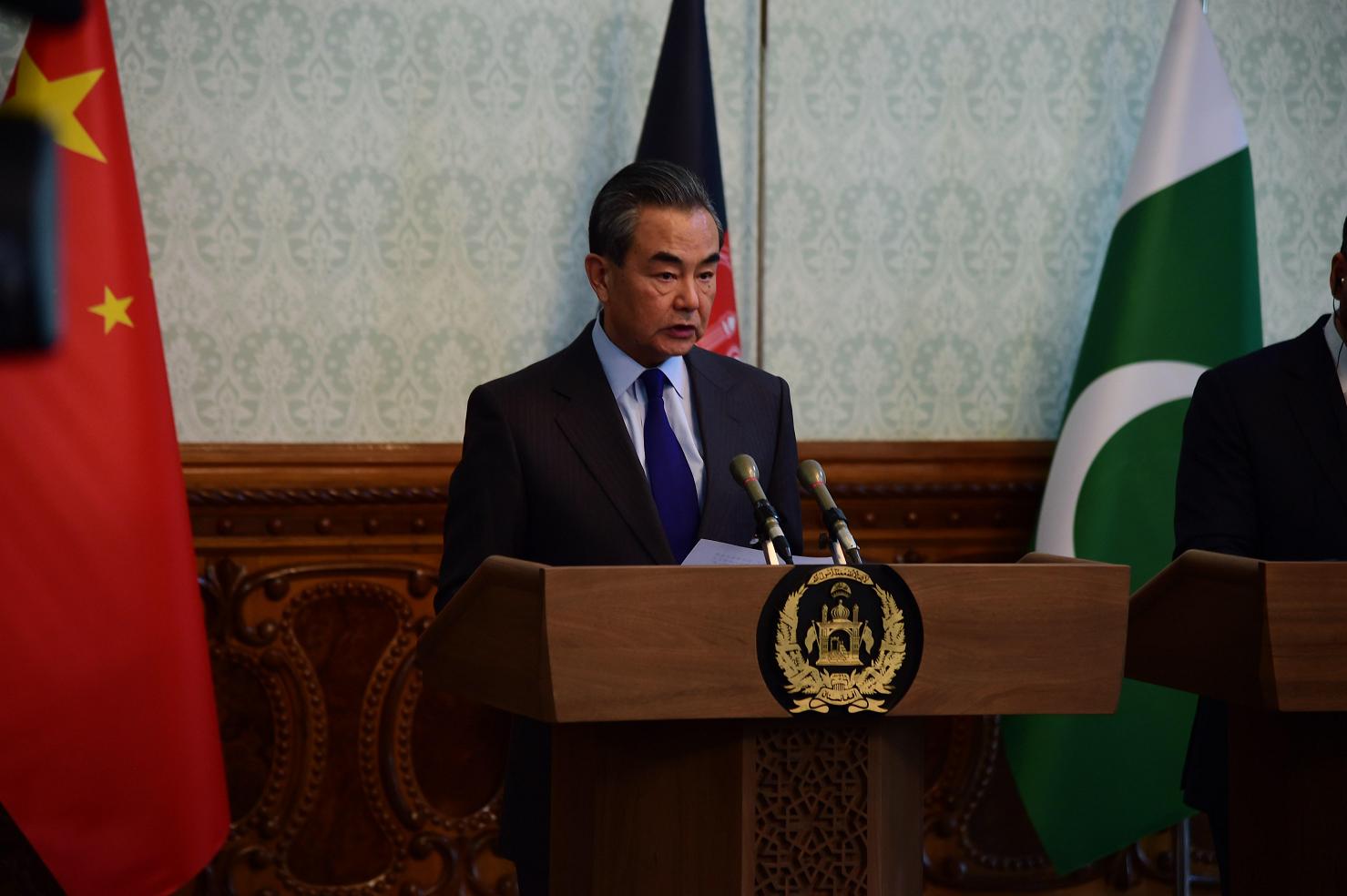
Chinese State Councilor and Foreign Minister Wang Yi speaks to the press after attending the 2nd China-Afghanistan-Pakistan Foreign Ministers' Dialogue in Kabul, Afghanistan, on Dec. 15, 2018.
Firstly, the three sides agreed to make use of the foreign ministers' dialogue and relevant mechanisms to strengthen coordination and communication in planning and promoting trilateral cooperation in various fields, Wang said.
Secondly, amid important opportunities in Afghanistan's reconciliation process, the three sides are willing to strengthen coordination and push for the Taliban's early return to the negotiation table and reintegration into mainstream politics, Wang said.
Afghanistan is willing to continue push forward the peace plan and push for the resume of peace talks, while China and Pakistan firmly support the Inclusive Afghan-led and Afghan-owned reconciliation process, he said.
Thirdly, Afghanistan and Pakistan agreed to further improve bilateral ties, implement the Afghanistan-Pakistan Action Plan for Peace and Solidarity, boost positive interactions in political, military, economic and security fields, handle disputes through friendly consultation, and properly manage temporarily intractable differences to avoid undermining the improvement of the bilateral ties, said Wang.
Fourthly, the three sides committed to a tightened trilateral cooperation, promising to explore possibilities for projects regarding people's livelihood and transportation infrastructures, on the basis of personnel exchanges and training, Wang said.
Fifthly, the three sides agreed to promote the construction of the China-proposed Belt and Road Initiatives in a bid to boost regional connectivity and economic development, said the Chinese top diplomat.
China and Pakistan supported Afghanistan to make itself a regional pivot by giving a full play of its geographical advantages and to benefit from regional cooperative projects including the China-Pakistan Economic Corridor, he noted.
Sixthly, the three sides also vowed to implement the newly signed Memorandum of Understanding (MoU) on Counter-Terrorism, enhance dialogues on counter-terrorism policies and push forward pragmatic counter-terrorism cooperation, while taking a strong and firm stand against terrorist organizations including the East Turkestan Islamic Movement, said Wang.
China would offer support and help to Afghanistan and Pakistan regarding counter-terrorism causes and cooperation, he added.
Wang Yi said peace is the strong desire of the Afghan people and the important precondition for the reconstruction and development of Afghanistan.
China welcomes the peace initiatives put forward by the Afghan government and appreciates the assistance the international community has provided for the peace process in Afghanistan, Wang said, adding China supports all efforts aimed at bringing an end to the war and conflict and realizing peace in Afghanistan.
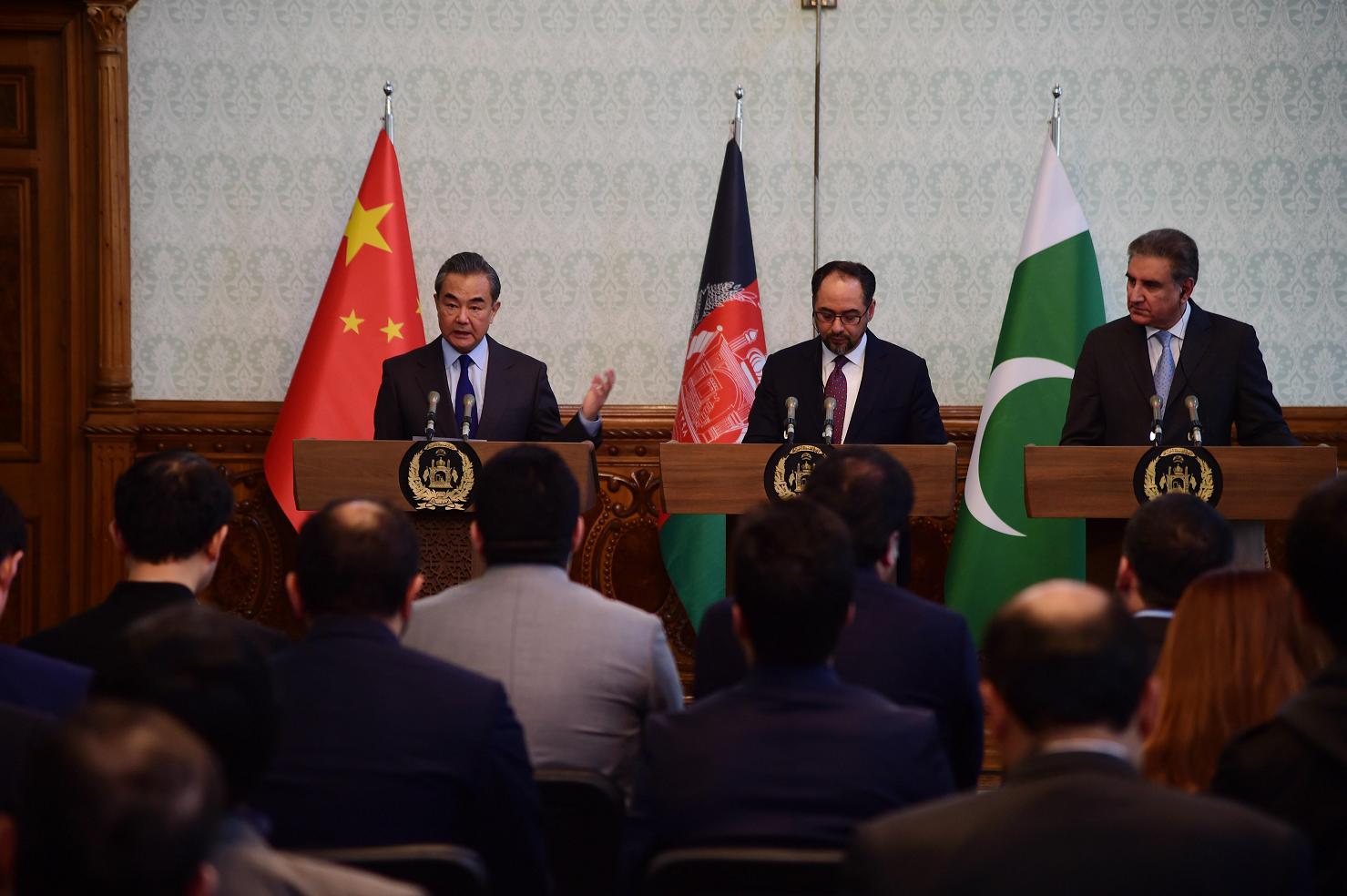
Chinese State Councilor and Foreign Minister Wang Yi speaks to the press after attending the 2nd China-Afghanistan-Pakistan Foreign Ministers' Dialogue in Kabul, Afghanistan, on Dec. 15, 2018.
The reconciliation in Afghanistan is ultimately a matter of the Afghan people, and Afghanistan's sovereignty, independence and the will of the Afghan people should be fully respected. The principle of the inclusive Afghan-led and Afghan-owned peace process which is recognized by the international community and the Untied Nations Security Council should be honestly implemented, Wang said.
"We urge the Taliban in Afghanistan to respond to the peace initiatives and return to the negotiation table as soon as possible."
Wang said China is a good neighbor of Afghanistan and helping Afghanistan achieve peace, stability and economic development is China's sincere desire.
China is willing to continue using its advantages to serve as a supporter, mediator and participant of Afghanistan's reconciliation on the basis of respecting the will of all the parties in Afghanistan, he said.
Pakistan is an important neighbor of Afghanistan and China is willing to work together with Afghanistan, Pakistan and the international community to push forward the peace process in the war-torn country for new breakthroughs, Wang added.
Afghan President Mohammad Ashraf Ghani on the same day met with Wang Yi, with both sides expressing willingness to deepen cooperation and combat terrorism.
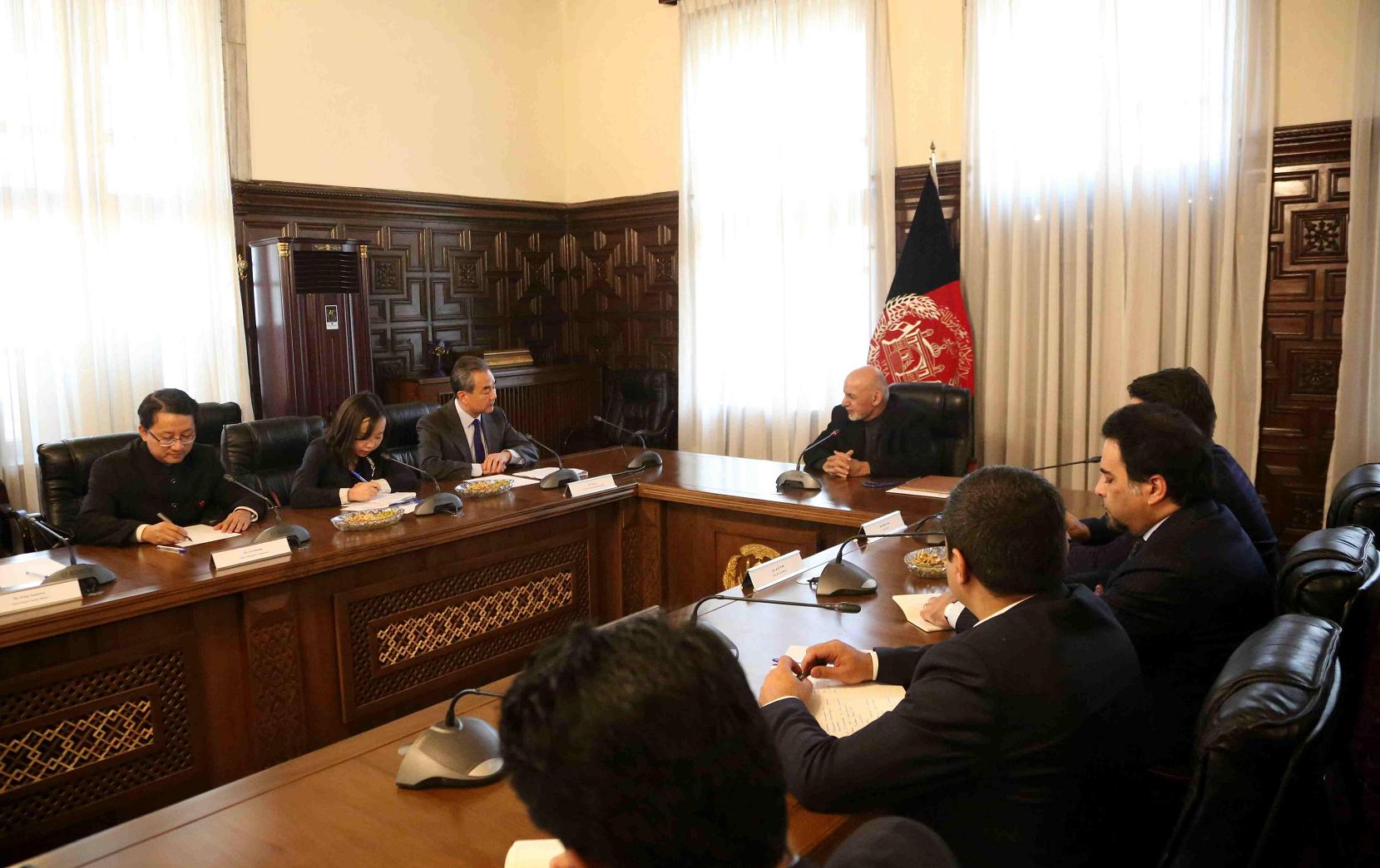
Afghan President Mohammad Ashraf Ghani meets with visiting Chinese State Councilor and Foreign Minister Wang Yi in Kabul, Afghanistan, on Dec. 15, 2018.
Wang said the Chinese side is willing to work with the Afghan side to implement the consensus reached by leaders of the two countries, and push forward the bilateral strategic cooperative partnership for further development.
Afghanistan is China's important partner to jointly implement the Belt and Road Initiative, and China is willing to expand bilateral trade and investment with Afghanistan and help Afghanistan speed up its reconstruction and development process, Wang said.
China appreciates Afghanistan's efforts in fighting the East Turkistan Islamic Movement, and will continue to offer support and help for Afghanistan's anti-terrorism capacity building, he said.
Wang said the Chinese side appreciates the measures of the Afghan government in promoting the reconciliation process and supports the international community to play a constructive role on the matter.
China is willing to work with Afghanistan and Pakistan to seriously implement the results achieved at the 2nd China-Afghanistan-Pakistan Foreign Ministers' Dialogue, promote the continuous improvement of relations between Afghanistan and Pakistan and further push forward the development of the trilateral cooperation.
For his part, Ghani said his country is willing to deepen pragmatic cooperation with China, expand trade and increase personnel training.
The Memorandum of Understanding (MoU) on Counter-Terrorism signed by Afghanistan, China and Pakistan will strongly push forward the regional anti-terrorism cooperation, and the Afghan side will continue to firmly strike all forms of terrorism, the Afghan president said.
Wang also met with Afghan Chief Executive Abdullah Abdullah here on Saturday.
The Chinese state councilor said the two countries have witnessed friendly development of bilateral relations thanks to the support from the leaders of both sides and the two peoples.

Afghan Chief Executive Abdullah Abdullah meets with Chinese State Councilor and Foreign Minister Wang Yi (L) in Kabul, Afghanistan, on Dec. 15, 2018.
China is willing to work with Afghanistan to further strengthen personnel training, enhance local-level cooperation, improve people's livelihood, steadily advance the aid programs for Afghanistan and further push forward the cooperation in all fields between the two sides, he said.
Wang said the 2nd China-Afghanistan-Pakistan Foreign Ministers' Dialogue has achieved positive results and reached consensus. On the basis of fully respecting the willingness of the Afghan side, China is willing to continue playing a constructive role and support the Afghan government in pushing forward the Afghan-led and Afghan-owned reconciliation process so as to achieve the inclusive political reconciliation at an early date.
China appreciates the progress achieved in the improvement of relations between Afghanistan and Pakistan, supports the two countries to strengthen dialogue, promote mutual trust and continue to improve bilateral relations. China is willing to work together with the two countries to deepen anti-terrorism cooperation and fight terrorism in all forms, Wang said.
Abdullah, for his part, said the two countries have witnessed the sound development of bilateral ties with cooperation in every sector yielding fruitful results.
Afghanistan will continue to support China on issues concerning China's core interests, Abdullah said.
Afghanistan is devoted to pushing forward the peace process in the country and is willing to continue improving ties with Pakistan, Abdullah added. Enditem. (By Xinhua writers )
